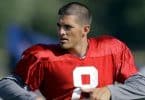Barry Sanders (born July 16, 1968) is a former NFL running back who played for the Detroit Lions for 10 seasons. He led the league in rushing yards four times and rushing touchdowns once, known for his elusiveness despite being only 5 ft 8 and weighing 203 lbs.
He played college football for the Oklahoma State Cowboys, winning the Heisman Trophy in 1988. Sanders retired in 1999 with 15,269 rushing yards and 99 touchdowns. He was inducted into the Pro Football Hall of Fame in 2004 and ranked No. 1 by Bleacher Report as the greatest running back.
RELATED: Vince Neil Net Worth: Mötley Crüe’s Monetary Majesty
Table of Contents
Barry Sanders Net Worth
Barry Sanders has a net worth of $8 million. After being drafted in 1989, the Detroit Lions offered him a $2.6 million contract, but Barry’s father insisted on a higher value. Barry eventually signed a 5-year, $9.5-million contract, worth about $20 million today.

In 1997, he signed a 6-year, $34.5-million deal with an $11-million signing bonus, making him the highest-paid player in the NFL. Barry retired unexpectedly, and the Lions sued him for $7.5 million of the bonus, which he repaid by liquidating stocks.
Early life
Barry Sanders was born on July 16, 1968, in Wichita, Kansas, the seventh of eleven children to William and Shirley Sanders. His father worked as a roofer and carpenter, while his mother was a homemaker. Sanders played football at Wichita North High School, where he initially played defensive back and later became the starting running back in his senior year.
He rushed for 1,417 yards and 17 touchdowns. He received scholarship offers from Wichita State, Iowa State, University of Tulsa, and Oklahoma State University, where he played despite initial opposition from his father.
Career
In 1989, Barry Sanders was picked up by the Detroit Lions, making an immediate impact despite concerns about his short stature. He proved to be strong and quick, with a low center of balance that made him almost impossible to take down. In the 1990s, Sanders helped the Lions reach the playoffs nine times, though he never reached the Super Bowl.
He averaged over 1,500 rushing yards per season, with standout years in 1994 and 1997. Despite his success, Sanders remained humble and avoided over-the-top celebrations.
Personal life
Barry Sanders is a Christian. He and his wife, Lauren Campbell Sanders, a former news anchor for WDIV in Detroit, filed for divorce in February 2012 after 12 years of marriage. Barry’s brother, Byron, was the starting running back at Northwestern University and was drafted by the Chicago Bears in the 9th round of the 1989 NFL draft.

Barry has four sons: Barry J. Sanders, Nick, Nigel, and Noah. Barry J. Sanders played at Stanford University and Oklahoma State University. In 2024, Barry opened a new car wash in Madison Heights, Michigan.
Why did Barry Sanders quit football?
Barry Sanders claimed that the reason he retired at age 30 after a 10-year career was to take time to sort through his feelings and ensure that his decision was made with conviction. In his letter, Sanders explained that he wanted to be certain about his choice, despite already securing a place in the Pro Football Hall of Fame. His retirement came on the eve of camp, leaving many fans and critics shocked.
RELATED: Faith Evans Net Worth: Harmonious Hits and Hefty Holdings
Conclusion
Barry Sanders’ journey from a standout college athlete to an NFL superstar and beyond is a story of athletic excellence and wise financial management. His legacy in the NFL is matched by his success off the field, where he has built a considerable net worth through smart investments and ventures, cementing his status as a legend both on and off the gridiron.
FAQs about Barry Sander’s Net Worth
- How did Barry Sanders accumulate his net worth? – Sanders’ net worth was primarily built through his NFL earnings, lucrative contracts, and endorsements during and after his football career.
- What ventures contributed to Sanders’ wealth post-retirement? – Sanders has been involved in various businesses and promotional activities since retiring, which have significantly contributed to his wealth.
- How does Barry Sanders’ financial success compare to other NFL players of his era? – While not the wealthiest of his contemporaries, Sanders’ financial success is noteworthy, especially considering his relatively short career.
- Has Sanders been involved in any significant business failures? – There is no public record of significant business failures for Sanders, indicating a careful approach to his investments and business ventures.
- What impact did Sanders’ NFL contract have on his financial status? – Sanders’ NFL contract, particularly the lucrative deal signed in 1997, was a cornerstone in building his wealth, setting him up for financial stability post-retirement.













